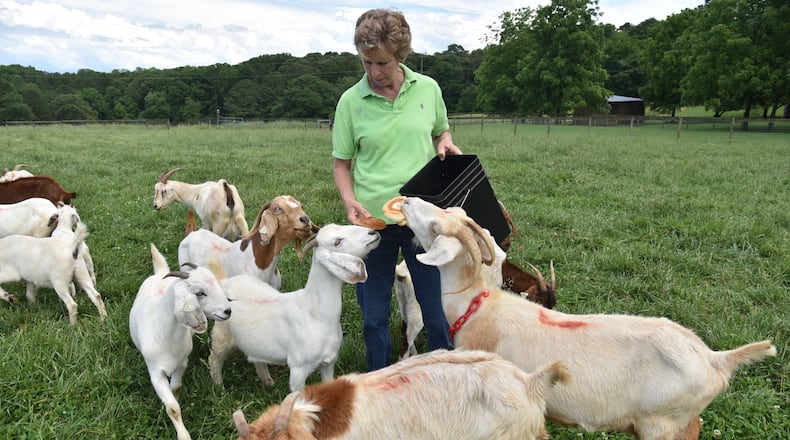A 50-acre goat farm in Acworth many hoped would be bought by the county as a park is no longer up for consideration, its owner says, after the two parties failed to agree on a price.
The property is one of four that have been dropped from a list of potential park land as the county struggles to fulfill new Chairman Mike Boyce’s promise to buy more park land. The county’s official position is that it cannot pay more than the appraised value for land, but property owners and legal experts question that interpretation.
In 2008, voters approved a $40 million bond issuance to buy green space, but the recession set in and officials never issued the bonds. With each year that passed, the county missed the opportunity to collect scheduled revenues. By the time the bonds were issued in April of this year, there was only $27.4 million remaining.
In the meantime, debt service millage that would have gone to pay off park land was shifted to help pay for the stadium. Since Chairman Boyce's swearing in, the county agreed to pay another $14 million the Braves say Cobb owes. On the campaign trail, Boyce asked why Cobb residents could vote on a $40 million park bond but not a $400 million stadium, referring to SunTrust Park, home of the Atlanta Braves.
Boyce has pledged to find another source of funding to make up the full $40 million park advocates demand, and recently acknowledged difficulties in acquiring land.
"We're doing our best," Boyce said at a May 8 meeting. "We're having some issues right now with some property owners."
Charline Cambron, owner of Rosewood goat farm, which has been nominated as a potential park three times, said this week she was very unhappy with the price the county offered her for the land.
“It’s not realistic at all,” Cambron said. “The way I understand it right now, that’s it. It’s done and over with.”
Cambron said she has not had the property appraised since 2003, but said the county’s offer was below market value. She was told the offer, which she is bound by confidentiality not to reveal, was based on the county’s appraisal of the land.
In 2017, the Cobb tax assessor’s office valued the two tracts that make up Cambron’s property at about $780,000. Property tax assessments do not necessarily align with market value.
“They said they could not pay me any more than the assessed value and I did not argue with them,” Cambron said.
She said taxpayers should understand that if the property is sold to a private developer, the county will be on the hook to provide infrastructure and services.
County Attorney Deborah Dance said Cobb officials have adopted a “fair and transparent process” for the purchase of future parks lands “that respects both their fiduciary responsibility for public funds and the Georgia Constitution.”
“As County Attorney, it is my interpretation that the State Constitution restricts public officials from providing a ‘gratuity’ to potential sellers,” Dance wrote in an email. If the county were to pay more than recommended by an independent appraisal, it could run afoul of the gratuity clause, she wrote.
But Larry Ramsey, deputy general counsel for the Association County Commissioners of Georgia, said counties are given broad discretion in acquiring property and that he is unaware of any state law that would prohibit the county from competitive bidding.
It is unclear what constitutes “gratuity”—giving something for nothing—under the Constitution, he added.
“Fair market value is often in the eye of the beholder,” he said. “Is there a number over fair market value at which it’s a gratuity? Maybe.”
Meanwhile, Greenspace advocates’ patience is wearing thin—members of the Cobb Parks Coalition have taken to showing up at County Commission meetings rattling a bucket of change in a symbolic plea for the full $40 million.
Roberta Cook, a parks coalition volunteer, said advocating has been complicated by the fact that the list of properties is not public. As a taxpayer and a greenspace advocate, she thinks the county can get “creative” in offering incentives, urging officials to reach out to specialized organizations like the Trust for Public Land.
“I don’t know why they have so much difficult fulfilling a voter mandated initiative,” she said. “I don’t understand what’s holding them back.”
On May 22, the county sent out a statement assuring the public that Cobb “continues to move forward” on parkland.
“Of the original ten properties identified as the highest in priority, four have been removed from consideration based on the fact that the county was not able to reach an agreement with property owners or the properties were unsuitable for park purposes,” the statement quoted Pat Riley, the real estate attorney in the County Attorney’s Office who is handling negotiations on behalf of the county.
In addition to the goat farm on Baker Road in Acworth, the county has removed properties on Post Oak Tritt, Fowler, and Kurtz Roads. The County Commission has directed that additional properties be added to the active list under consideration, the statement said.
*Correction: The park bonds were issued in the amount of $27.4 million, not $24.7 million.
MYAJC.COM: REAL JOURNALISM. REAL LOCAL IMPACT.
The AJC's Meris Lutz keeps you updated on the latest happenings in Cobb County government and politics. You'll find more on myAJC.com, including these stories:
Never miss a minute of what's happening in Cobb politics. Subscribe to myAJC.com.
About the Author
Keep Reading
The Latest
Featured



